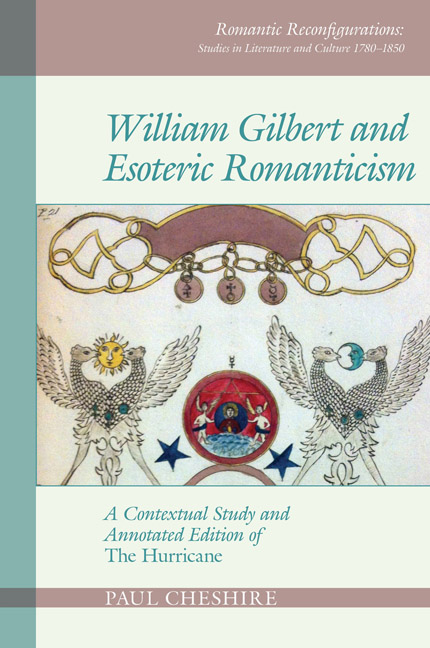 William Gilbert and Esoteric Romanticism
William Gilbert and Esoteric Romanticism Book contents
- Frontmatter
- Dedication
- Epigraph
- Contents
- Acknowledgements
- Abbreviations
- List of Figures and Illustrations
- Introduction
- Part One William Gilbert in Romantic Culture
- Part Two The Hurricane
- Note on the Text
- Table of Correspondences
- The Hurricane: a Theosophical and Western Eclogue. To which is subjoined, A Solitary Effusion in a Summer's Evening
- 6 The Hurricane and Hermetic Geography
- 7 Decoding the Allegory of the ‘Theosophical and Western Eclogue’
- 8 Son of a Saintly Slave Owner
- Part Three Conclusion
- Bibliography
- Index
8 - Son of a Saintly Slave Owner
from Part Two - The Hurricane
- Frontmatter
- Dedication
- Epigraph
- Contents
- Acknowledgements
- Abbreviations
- List of Figures and Illustrations
- Introduction
- Part One William Gilbert in Romantic Culture
- Part Two The Hurricane
- Note on the Text
- Table of Correspondences
- The Hurricane: a Theosophical and Western Eclogue. To which is subjoined, A Solitary Effusion in a Summer's Evening
- 6 The Hurricane and Hermetic Geography
- 7 Decoding the Allegory of the ‘Theosophical and Western Eclogue’
- 8 Son of a Saintly Slave Owner
- Part Three Conclusion
- Bibliography
- Index
Summary
The characteristic Coleridgean question – not ‘Is this true?’ but ‘What is the meaning of it?’
John Beer, Coleridge's Poetic Intelligence, p. 7.In March 1790, when the abolitionist movement was waging a fierce public debate against the defenders of slavery in preparation for an Abolition Bill to be put before parliament, a short essay by Gilbert on the ‘African Slave Trade’ appeared in The Bristol Mercury. Gilbert starts by setting out the justifications offered by the ‘West-Indians’, including the well-worn argument that the enslaved Africans benefit by being offered instruction in ‘Morality, Civilization and Religion’. He then goes on to demolish their claims, and denounce these ‘Dealers in Slaves and Souls of Men’ as ‘Epicures in Assassination and Oppression’.
Such forthright expressions of abolitionist sentiments are common enough at this time, but Gilbert's denunciations are complicated by the fact that he himself belonged to a slave-owning family and was entitled to income derived from the substantial slave plantation in Antigua that had been in his family for three generations; he was bequeathed slaves in his father's will, and his elder brother, the Reverend Nathaniel Gilbert, currently owned the plantation. Their late father Nathaniel Gilbert senior was renowned among the Methodists through letters he had written to John Wesley about his preaching, which were published between 1780 and 1783. These revealed that Nathaniel senior was the founder of the first Methodist Society in the West Indies, who, furthermore, preached to slaves: an innovation that was opposed by his fellow planters on the island. There are signs that neither Nathaniel senior nor junior were comfortable about the institution of slavery. Nathaniel junior stayed away from Antigua: he lived in England as an absentee landlord except for a brief stay in Sierra Leone in 1792, where he served as chaplain to a new colony of freed slaves. One purpose of this colony was to subvert the transatlantic slave trade by providing the market with an alternative source of sugar produced with free labour
William Gilbert's ideas about Africa take on a new significance when set against this slave trade background in which his family was implicated. His belief that he was an emissary spiritually linked to a secret location in Africa from where a divine power was conducting revolutionary changes in the world is a striking contrast to the condition of Africa and Africans in the real world.
- Type
- Chapter
- Information
- William Gilbert and Esoteric RomanticismA Contextual Study and Annotated Edition of ‘The Hurricane’, pp. 202 - 216Publisher: Liverpool University PressPrint publication year: 2018


